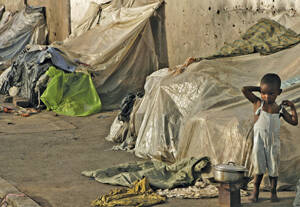Catholic Relief Services said that its decision to allocate $5.3 million in emergency funding to the humanitarian organization CARE in 2010 under a U.S. government grant did not violate Catholic teaching. In postings on its Web site on July 20 and July 24, the U.S. bishops’ international development and relief agency explained that the money it provided to CARE was specifically used for water, sanitation and nutrition programs for poor families in Central America and Africa and could not be transferred to other services provided by CARE.
The C.R.S. statements came in response to an online report that criticized C.R.S.’s decision to work with CARE because that agency provides contraceptives and other family planning services to women. C.R.S. said the report, which made its way to several Web sites, contained “inaccurate and scurrilous accusations.”
John-Henry Westen, editor of LifeSiteNews and author of the article, stood by the story. In particular, he pointed to the findings of John Haas, president of the National Catholic Bioethics Center in Philadelphia and a consultant to the U.S. bishops’ Committee on Pro-Life Activities, who said the distribution of funds to CARE could pose risk of “scandal.” Haas, however, also told C.R.S. that none of the grants in question that the Catholic agency made to partnering organizations constituted support of or involvement in immoral activities.
“C.R.S. is not in agreement with CARE’s policy on contraception because we do not support any positions that would be in violation of Catholic teaching on human dignity and the sanctity of human life,” the church relief agency said on July 24. “Any funding Catholic Relief Services provides to CARE or any other international humanitarian organization comes from an outside source such as the federal government or a foundation, for a specific project, and has strict restrictions on its use.
“The grant in question with CARE,” the statement continued, “was used to provide vitally needed food, clean water, sanitation services and basic nutrition programs to desperately poor families in Zimbabwe, Madagascar and five countries in Central America. Make no mistake about it, these programs are saving lives.”
C.R.S. said on July 20 that it vetted its partnerships with CARE and other organizations in 2011 with Haas. The agency said the center’s review concluded that none of the grants to partnering organizations constituted support of or involvement in immoral activities and that there was “little to no risk” of grant funds being used for programs outside of the grant request or for freeing up money at the receiving organization for immoral purposes. The review noted, however, that there could be a risk of “scandal over such partnerships if people become confused and wrongly assume that C.R.S. was endorsing a partner’s position on other issues.” C.R.S. explained that it continues to work with the U.S. Conference of Catholic Bishops and the bioethics center to address such risk.








